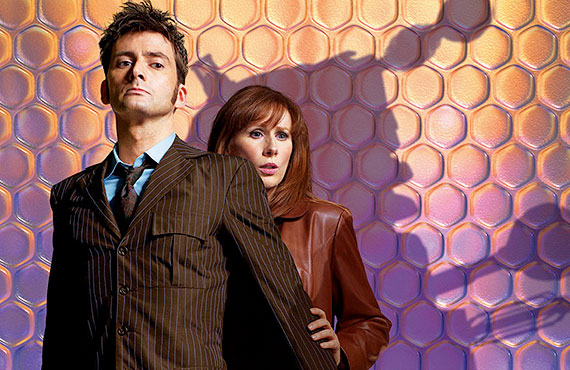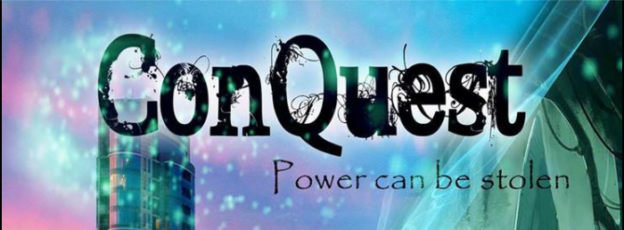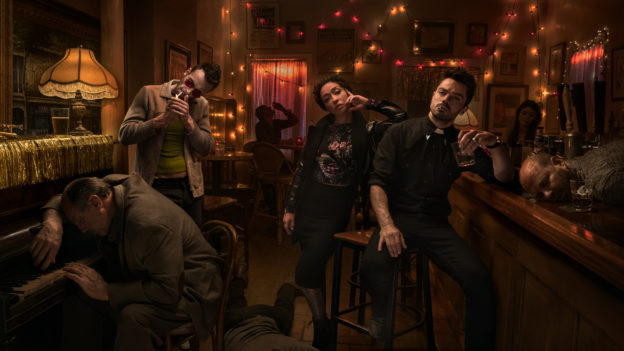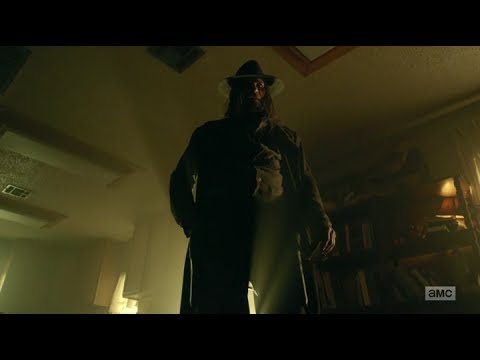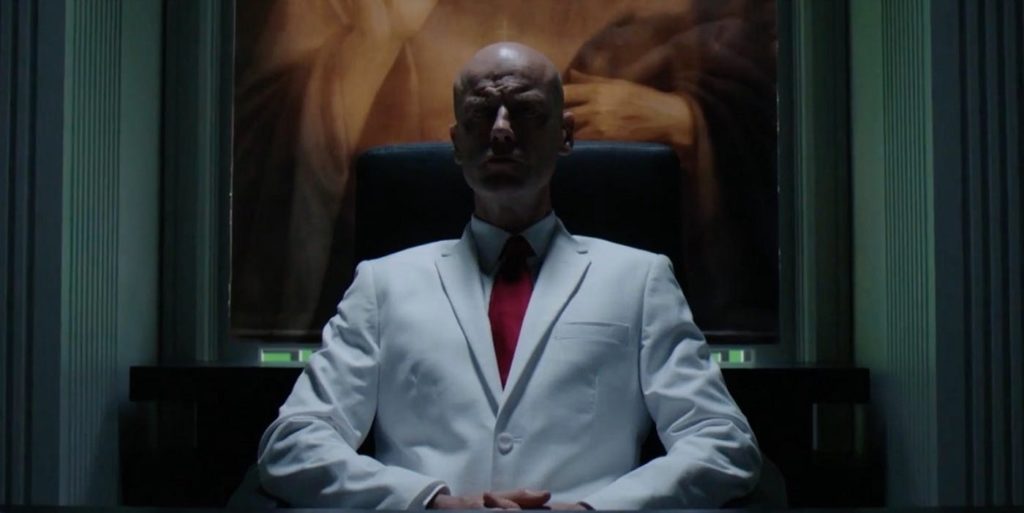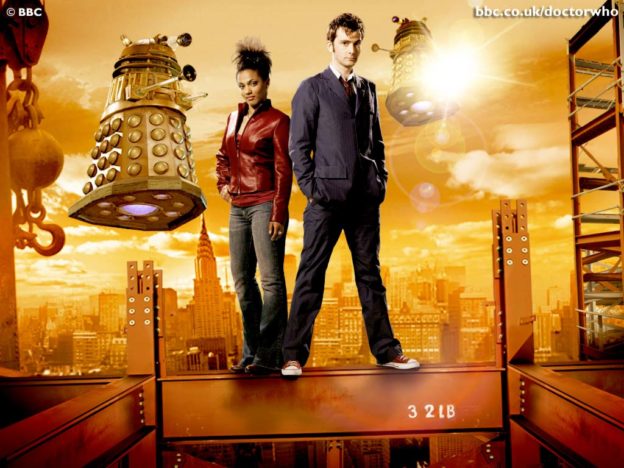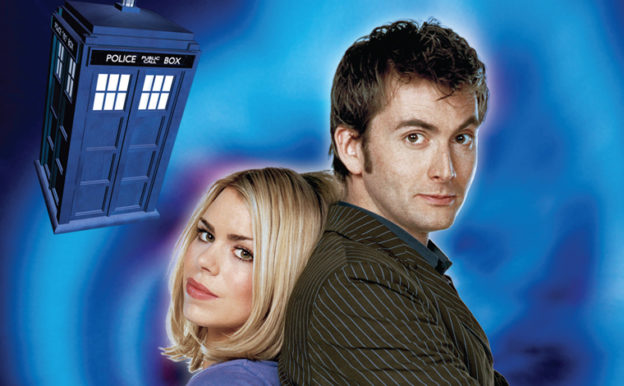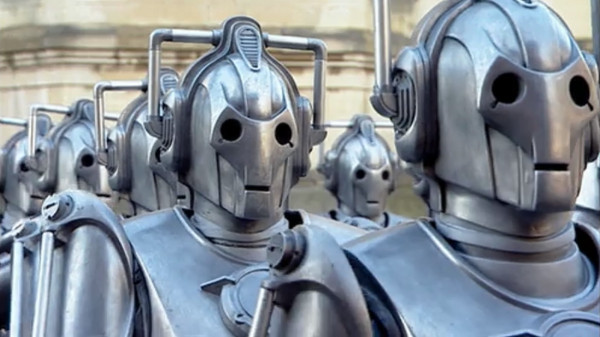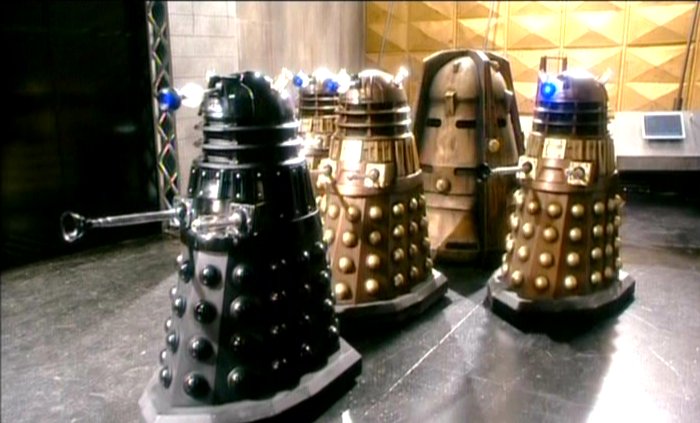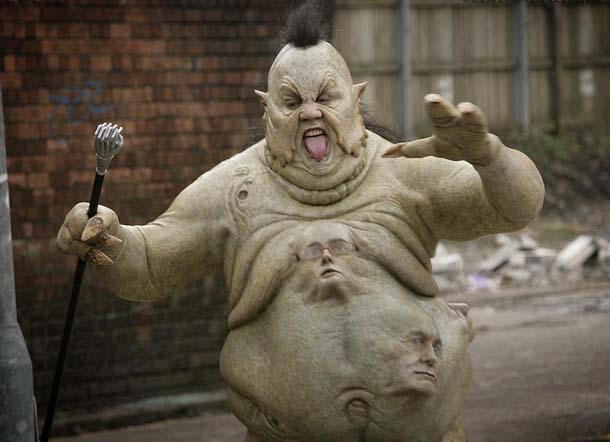There’s a new Doctor on the horizon. The first female Doctor. This has some people wondering if it’s time to try out this show I love so much.
Well, that’s what I’m here for. Because when you love a show as much as I love Doctor Who, you have opinions.
These are mine.
It’s Christmas!
Voyage of the Damned was the first “apropos of nothing” Christmas special, not setting up or paying off stories from the main series or centered around a recent/impending regeneration. It’s got all of the hallmarks: a one-off story (not unique, most Doctor Who stories are one-offs), a one-time companion, and a weird amount of heartbreak for freaking Christmas. The only exception here is that they do technically introduce a character of interest, even though they didn’t necessarily know that at the time. But maybe they did? Could be, he is back on the show in the first episode of series four.
Anyway. Moments after dropping off Martha Jones at the end of Last of the Time Lords… or depending on how canonical you consider it, moments after the really sweet Moffat-written Children in Need short Time Crash in which the Tenth Doctor meets the Fifth (who both Tennant and Moffat grew up watching)… sorry, where was I.
Moments after dropping off Martha Jones… sorry, but it just is really endearing watching David Tennant give a tribute to the man who helped shape his childhood love of the character, both lightly mocking things like the stalk of celery he wore on his lapel and paying homage by listing all the Fifth Doctor quirks that Tennant incorporated into his own take. Right, back to it.
Moments after dropping off Martha Jones— and the moment where he looks at Davison and says “You were my Doctor,” that is just–
Right. Got it. For real this time. Moments after dropping off Martha Jones at the end of Last of the Time Lords, The Tardis collided with a luxury liner called The Titanic, for the second consecutive finale cliffhanger in which Tennant was reduced to just “What!? What!? What?” Turns out to have been the Starship Titantic, bringing alien guests on a stellar cruise to Christmas-time Earth.
“Why is called Titanic?” the Doctor asks one of the slightly creepy robot angels called Hosts that just seem to cry out “These go on a killing spree in the second act” the second you see them.
“Information: the Titanic is the most famous ship in Earth history,” the benign assistant about to go full murder-bot says.
“Yeah, cheers, any mention of why it’s famous?”
So it’s pretty clear where this is going. The Doctor meets a waitress named Astrid (played by Kylie freaking Minogue), a poor couple who won first class seats named Morvin and Foon, a tour guide with faulty Earth information named Mr. Copper, an upper class bag of putrid dicks named Rickston Slade, and a fun-sized spiky alien named Bannakaffalatta.
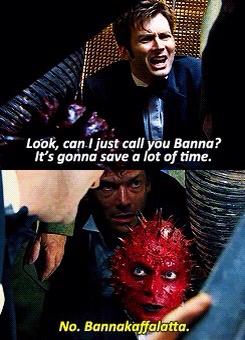
And just as everyone’s bonding and having a great time, the sudden yet inevitable disaster strikes, and it’s up to The Doctor to save who he can. Which… well, the disaster movie template requires that it not be too many people, and it’s not who you’d expect or hope.
Don’t get attached to Astrid, is what I’m saying, fully aware that you will anyway.
It’s a fun and touching episode with an instantly likable supporting cast (save for that asshat Rickston) and moments almost guaranteed to bring out the tears. First being the most unlikely yet brutally effective tug at the heartstrings…
“Bannakaffalatta stop! Bannakaffalatta proud. Bannakaffalatta… CYBORG!”
And then, of course, The Doctor’s desperate wail, pain masked by rage, determination giving way to failure… “I can do anything!”
And along the way, there’s an alien-suspecting newspaper salesman played by Bernard Cribbins that you’ll want to keep an eye on.
Series Four: Companionpalooza!
It took me a year and a half to get around to this. My PVR didn’t record series four in fall of 2008, and somehow it took me until spring of 2010 to catch up. Nineteen months of thinking “I need to get on that.” Never again.
Series four was Russell T. Davies’ last full series as showrunner, and he intended to go out big. Donna Noble’s return becomes the capstone to an arc that began with the Cult of Skaro’s appearance in Army of Ghosts, although I have no proof that Davies actually meant for Army of Ghosts, The Runaway Bride, and Evolution of the Daleks to all be pieces of one larger story.
Martha Jones (who has joined UNIT, as we learned in series two of Torchwood) is back for three episodes in the middle, Rose Tyler is trying to reach The Doctor, and those are just opening salvos. For the big two-part finale, everyone’s back, and I mean everyone. Everyone.
Rose, Martha, Jack, Mickey, Sarah Jane, K-9 (briefly), all three of the horrible companion mothers, even Former Prime Minister Harriet Jones. Jack brings Gwen and Ianto from Torchwood (allowing The Doctor and Rose to note her similarity to when the same actress was in The Unquiet Dead, waaaaaaay back in series one), Sarah Jane brings her son and supercomputer from The Sarah Jane Adventures. The only non-evil, still alive characters of note from the last four series missing are Nine (of course) and Pete Tyler.
And in the end, they all join together for one sweet, perfect, heartwarming moment where they all fly the Tardis the way it’s meant to be flown… as a team.
Enjoy it while it lasts, because the sadness is coming and coming fast. As an Ood warns earlier on… every song must end. And this song’s ending soon.
(Oh, and one more time for the kids in the bleachers… anyone who thinks the Moffat era relies too much on deus ex machina, rewatch this finale and explain yourself. It’s better, or at least more narratively satisfying than Last of the Time Lords, but it remains basically gibberish.)
The Doctor
Series four shaves a few layers of grief off of Ten this year. The loss of Rose is less fresh, so he’s less hung up on it (just in time for an unexpected reunion), and with the final villain not a fellow Time Lord, they don’t have to punch the grief over losing his homeworld and species in order to sell his determination to keep his old foe The Master alive.
This, then, is David Tennant as his apex as The Doctor. He’s always incredible to watch, because he is that astounding an actor basically always (look, people, I saw him live in London, and you just… you have no idea), but this year he cut loose and had the most sheer fun in the role.
Not that his white-hot rage and flares of grief are absent, because those are parts of the character. But by now it’s all a well-fitting suit. Two years of practice, and Tennant can really strut his way through time and space.
The Companion
Donna’s back!
Much as I somehow didn’t enjoy her first appearance in The Runaway Bride for reasons that I can no longer recall or comprehend, Donna Noble is the greatest of Tennant’s companions, fight me.
First of all, Donna doesn’t fall in love with The Doctor. And after two years of will-they-won’t-they with Rose and one year of quiet pining from Martha, that was refreshing.
Second, she has the best arc of possibly any companion ever. A simple temp from Chiswick, she doesn’t seem like most important person in all of time and space, and cannot believe that she might be, but she grows into that role over these 13 episodes. Plus, she is amazingly capable, often spotting clues The Doctor misses, and saving his soul along the way.
Catherine Tate and David Tennant have amazing comic chemistry together. It takes a few short minutes for them to become a screwball comedy double act again in Partners in Crime, and it remains delightful all the way through.
Road to the Medusa Cascade
A lot of big, epic stuff happens in the finale, requiring every recurring character of note from the first four years, but basically all of it happens in the last two episodes. Leading up to that, we have a few Bad Wolfs; recurring phrases, shots, or ideas that pop up throughout the year to hint towards what’s going to happen in the finale.
First, and most flashy, a series of blink-and-you’ll-miss-it cameos by Rose Tyler, leading up to her full return right before the finale in Turn Left.
Second, the bees are disappearing. A real-world environmental catastrophe that provides a key clue to The Doctor in The Stolen Earth.
Third, as the title The Stolen Earth suggests, planets are going missing. Whole planets, missing. Probably should have looked into that a little faster, Doctor, it was important.
And they sure do like to remind us that The Doctor keeps his old hand in a jar in the Tardis. You know, the one that was cut off and regrown right after his regeneration in The Christmas Invasion? That Jack had in his office throughout the first series of Torchwood? And that The Doctor took back from The Master in Last of the Time Lords? That one.
The Supporting Cast
Donna’s mother is kind of the laziest Russell T. Davies companion mother of the trio. Sylvia Noble is overly harsh with Donna, and at one point is quick to pin the Earth’s problems on The Doctor, the very person trying to stop them. She doesn’t have Jackie Tyler’s “Cautionary tale of mundane existence” or Mrs. Jones’ instant, irrational, sell-out-humanity commitment to distrusting The Doctor. In place, she has… not much. Not even grief for her husband, who we saw in The Runaway Bride but apparently passed on since then. She’s just mean to Donna. Like I said, kind of lazy.
There is, however, Wilf.
Wilfred Mott, played by Bernard Cribbins, made his first appearance in Voyage of the Damned, then in Partners in Crime was re-introduced and established as Donna’s grandad. (In The Sontaran Stratagem they underline that it’s the same guy.) And he is delightful. A believer in aliens, he also believes in Donna, and swiftly puts his faith in her new friend, despite having seem him vanish the previous Christmas.
Wilfred Mott is Ten’s final companion, but that’s still to come.
Also of importance this season… in Silence in the Library/Forest of the Dead, the annual Steven Moffat story, The Doctor meets an archaeologist by the name of River Song (Alex Kingston), who swings into the adventure with a knowing “Hello, Sweetie.” She claims to already know him, but he’s never seen her before. An awkward situation for them on your first watch, heartbreaking once you’ve reached series six. River’s going to be vitally important down the line, but for now enjoy her intro/exit.
(Is River’s dismissal of Ten as not “the real Doctor,” not the Doctor she needs right now, a statement by writer Steven Moffat about how he intends to write a better Doctor once he takes over? No. No, it couldn’t be, could it? No… no. Maybe–no. No, Tennant hadn’t even committed to leaving yet, although… Let’s not worry about it.)
The Monsters
The Big Bad: Welcome back to the stage Davros, mad genius of Skaro, creator of the Daleks. This is a dude in serious need of some chill, and is out to unmake reality. Shame that there’s practically no trace of him for eleven episodes. Honestly, the whole “just drop a few buzzwords and then have them be important in the finale” Davies model can be just a touch unsatisfying.
Davros works almost better as a dark mirror to The Doctor than The Master. All of The Doctor’s genius with none of his compassion. Where The Doctor devotes his incredible mind to kindness, Davros is fixated on destruction. But he is able to cut into The Doctor’s very being, showing that they both create weapons of death: Davros created the Daleks, The Doctor makes weapons of his friends, and has left a trail of (mostly) good people dying in his name in his wake. There’s even a montage of people who died to help him, starting with Jabe the Tree from End of the World and going all the way to the unnamed hostess from Midnight. Davros might lose, but that revelation about The Doctor cuts deep and won’t heal in a hurry.
This year in Daleks: Dalek Caan, last survivor of the Cult of Skaro, managed to break through the unbreakable seal and pull Davros out of the Time War, so that he could build a new Dalek Empire. In the process, Caan went more than a little crazy. Anyway, brace for another trip on the old “The Daleks are back, the Daleks have been wiped out, the Daleks are back” rollercoaster. But a decent one.
Classic Monsters Revived: Say hello to the Sontarans, a cloned race of short, potato-looking warriors out to either conquer all or die in battle. Makes them hard to threaten, when death in combat is almost as good as dying. The lead Sontaran is General Staal, but keep your eye on his second-in-command, Commander Skorr. He’s played by Dan Starkey, who has a bright future playing Sontarans on this show.
The Good: The Adipose, little blobs of sentient fat, are utterly adorable, even if their Nanny is a little aggressive with the humans they’re born from.
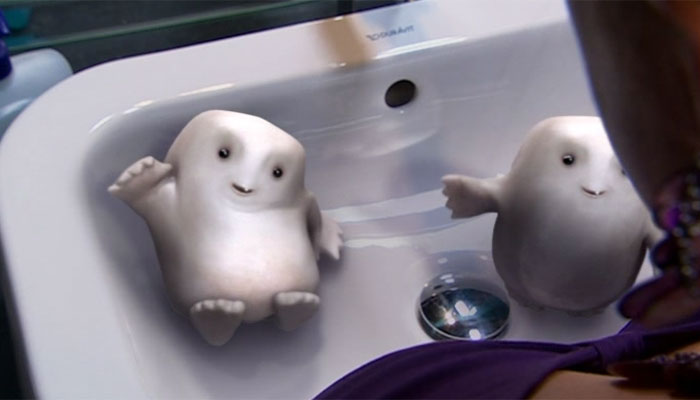
The Vashta Nerada, microscopic swarms living in shadows (“Not every shadow… but any shadow”) once again prove Moffat’s ability to wring scares out of very simple monsters. A kid in a gas mask, a mime made up like a stone angel, and now darkness and shuffling space suits.
People probably wouldn’t keep insisting that Midnight is the best episode of the year if the villain weren’t so effective.
And humanity itself manages to be the monster no fewer than four times, either by being the real villain (Planet of the Ood) or by being swift to sell their fellow humans out to the villain (The Sontaran Stratagem, and to a lesser extent Midnight, where humans’ ability to be nasty plays into the monster’s agenda).
The Bad: I guess the villain of Voyage of the Damned isn’t their best work.
The Ugly: The big damn CGI wasp from The Unicorn and the Wasp is a little cheesy-looking. And the Pyrovile sure shout their name more dramatically than they needed to…
High Point
Several people I know would say Midnight, in which The Doctor is trapped in a broken transport with a group of increasingly agitated passengers while an unknown monster lurks outside in an impossibly hostile environment. I disagree. I’m not saying it’s bad, I’m just saying it’s not even in my top three.
No, for my money, the single best episode of series four is Fires of Pompeii. The Doctor and Donna find themselves in Pompeii on, as Captain Jack Harkness once called it, Volcano Day. Donna confronts the dark side of time travel, The Doctor has to make a horrible choice, the cast is solid, the central story strong, the tragedy is profound, and the ending is simply beautiful, if still sad. Catherine Tate proves that she brings a lot more to the table than screwball comedy, and it features two guest stars who will go on to be major players of future series.
Midnight is highly effective. Fires of Pompeii is Doctor Who firing on all cylinders.
Low Point
Turn Left, in which a sinister alien uses a beetle thing to alter history, making Donna change one decision, ensuring she never met The Doctor. And without her, he doesn’t survive the events of Runaway Bride.
Want to know what would have happened if The Doctor hadn’t been around for any of the crises of the last two years? Think watching the world slide into ruin from the lack of Time Lord intervention might be fun? Well it isn’t.
Turn Left and Midnight came about for the same reason as Love and Monsters and Blink: need to compress the shooting schedule. The previous two years, they just gave The Doctor and his companion a much reduced role so that David Tennant and Billie Piper/Freema Agyeman could start filming the next episode at the same time. In this case, David Tennant could film the bottle episode of Midnight while Catherine Tate was doing Turn Left. Catherine Tate was certainly capable of shouldering an episode without Tennant’s help, but after a year filled with screwball comedy and high-octane adventure, Turn Left is just a major downer, and by the time Britain is building concentration camps I just really wanted it to be done.
Highlights?
Lots.
Silence in the Library/Forest of the Dead is a great two-parter from impending showrunner Steven Moffat, and as I’ll elaborate later, never, ever miss a River Song episode.
Partners in Crime is delightful screwball comedy that brings Donna back to the Tardis.
Unicorn and the Wasp continues a tradition of high quality Historical Guest Star episodes.
The Doctor’s Daughter is pretty incredible, as The Doctor, Donna, and Martha find themselves in the middle of a war between humans and fish-aliens called Hath fought through soldiers grown in instants from tissue samples of other people. Not clones, separate beings grown by reassembling the donor’s DNA. And when a sample is taken from The Doctor, resulting in Jenny, he must grapple with the notion that there’s a possible new Time Lord that is, in a way, his offspring. It’s one of the few episodes to acknowledge, and possibly the only one to drill into, the fact that once upon a time The Doctor had a wife and children. And at least one grandchild, whose name was Susan. And they’re all gone.
And Planet of the Ood is basically the best Ood episode, and they’re about to be important.
Skippables?
…Nope, can’t think of one. I don’t love Midnight, but I can’t advise skipping it. I mean for what it is, which is an incredibly tense bottle episode, it’s really well done. And The Sontaran Stratagem is a lot of build-up to the more engaging The Poison Sky, but is a “Previously on” segment really enough?
And Turn Left is the return of Rose and features Wilf. You probably shouldn’t skip that.
Parting Thoughts
Notable Guest Stars:
- Most important is Fires of Pompeii, which features both a future Doctor and a future companion. Peter Capaldi, at the time of writing about to end his reign as Twelve, appears as a marble merchant whose family becomes key to The Doctor and Donna’s investigations. Karen Gillan, future Guardian of the Galaxy and Jumanji victim, back then less than two years away from getting her own Tardis key, has a less significant role as a local prophet/priestess. There’s no callback to this for Gillan, probably because the makeup and accent disguise her more than, say, Freema Agyeman playing Martha Jones’ weirdly identical cousin the year before Martha was introduced, but the Twelfth Doctor looking exactly like some guy an earlier self met in Pompeii eventually gets an explanation.
- Academy Award Nominee and Rogue One platoon leader Felicity Jones turns up as a guest at the party in The Unicorn and the Wasp.
- In addition to Kylie Minogue, the crew of the Starship Titanic includes Being Human’s and apparently Quantico’s Russell Tovey and British actor of note Geoffrey Palmer.
- I mostly just know Colin Salmon as Oliver Queen’s stepdad from the first season of Arrow, but apparently he’s a big enough deal to have played himself in Master of None. Anyway, he’s in Silence in the Library and Forest of the Dead. As is Westworld hostess Talulah Riley.
- Midnight features David Troughton, son of Patrick Troughton, the Second Doctor. He’s not famous, but that’s neat.
Game of Thrones Guest Stars: Joe Dempsie, who GoT fans know as Baratheon bastard Gendry, turns up in The Doctor’s Daughter. And Tim McInnerny, who has been popping up lately in Winterfell as one of the crankier northern lords, but who I still remember as Percy/Captain Darling on Blackadder, is the would-be owner of the Ood in Planet of the Ood. If you claim to own a species, try not to meet The Doctor. It won’t go great.
Jenny in The Doctor’s Daughter is played by Georgia Moffett, the daughter of Fifth Doctor Peter Davison. And apparently she and Tennant hit it off on set, because they got married and had a daughter (possibly in that order). So The Doctor’s Daughter is played by The Doctor’s daughter, who married The Doctor and gave birth to The Doctor’s daughter. Only on this show.
Martha’s engaged to that doctor she met in the third series finale’s alternate timeline. Guess she looked him up after all. Won’t last, though. Their careers don’t match and he’s Lucifer.
After enduring Jackie Tyler’s pestering and Wossname Jones’ bitter paranoia, The Doctor lands a solid burn against Sylvia Noble’s constant belittling of Donna towards the end.
UNIT is back in a big way, though they suffer heavy losses against the Sontarans and the Daleks, and lose their flagship The Valiant. No more CG helicarriers for you, UNIT. Also, they reference The Doctor’s old pal and UNIT’s commander, Brigadier General Alistair Gordon Lethbridge-Stewart. Sadly he never made an appearance on the reboot.
Doctor Quote of the Year: Ten finally gets to say “Alons-y, Alonso!” but also mixes it up with the odd “Molto bene!” And everybody seems to take a turn saying “I’m sorry. I’m so sorry.”
Historical Guest Star of the Year: Agatha Christie solving a parlour mystery.
Saddest Moment: First time through, it’s got to be What Happens to Donna. But if you rewatch, if you know where things are going, if new characters have become old friends… then it’s in the Library. “All the time we’ve been together, you knew I was coming here.”
Next time… Russell T. Davies and David Tennant take a goodbye tour as the show mostly takes 2009 off.

